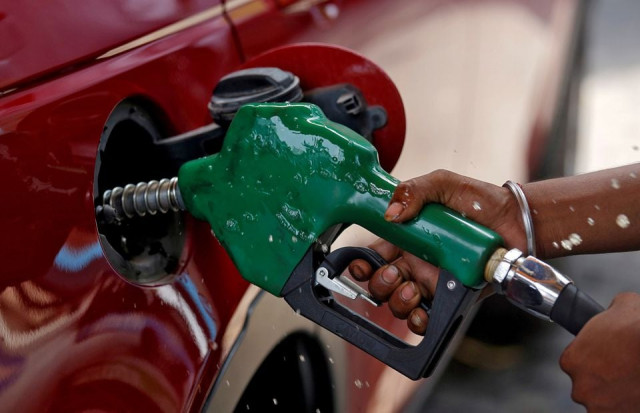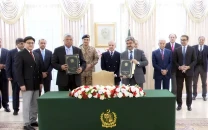$6 per barrel extra premium being charged
Petroleum division proposed adoption of mechanism for settlement of actual premium to ensure supply/import security

A default-like situation in Pakistan would cost fuel consumers heavily as the government has recently approved an upper limit of premium at maximum $15 per barrel, which may burden the consumers with an additional Rs10 per litre of diesel and petrol.
Currently, the suppliers are charging an extra premium of $6 per barrel on imports of diesel and petrol.
Sources told The Express Tribune that the oil market had become volatile and unpredictable, because of the Russia-Ukraine conflict, while suppliers had started loading country-specific risk factors such as L/C confirmation/bank charges etc, in their premium quotations, keeping in view the default-like situation witnessed in Pakistan since July, 2022.
Petroleum division officials said that this could be observed from a comparison of actualised premiums published in the Arab Gulf (AG) market and Pakistan State Oil’s (PSO) spot premiums for Mogas imports during March-October 2022.
They added that on average, suppliers had loaded about $6/BBL in their premiums during the last four months. Similar comparison for HSD showed that an average C&F premium of around $9/BBL, published in AG market during March October, 2022.
By loading country risk factor of $6/BBL, the upper limit of $15/BBL appeared to be appropriate for price computation for ensuring sustainable HSD imports by the OMCs, the officials said.
The petroleum division said that during a recent meeting of the ECC had approved the parameters to determine ex-refinery/import prices of Mogas (petrol) and HSD (diesel) on the basis of 15 days’ average prices of the Arab Gulf market (published in the Platts Oilgram), in July 2020.
Thereafter, the PSO’s last available average import premium and incidental charges – LC/bank charges, wharfage, port charges etc – were also added to determine C&F prices to finalise the consumer prices. The premium – freight & supplier’s margin – was a lump sum cost of the supplier/exporter, which was either negotiated or offered in a tender process.
The PSO, being a public sector company, was obligated to procure imports in accordance with the PPRA rules/regulations. As per the existing arrangements, the PSO imported its Mogas requirements entirely through spot tendering, while bulk of its HSD imports were made from Kuwait Petroleum Corporation (KPC) on the basis of a long-term agreement, which was revised/reviewed biannually.
The premium on long-term basis was lesser than the tendered premium. At present, the KPC premium for PSO’s HSD cargoes for July-December 2022 was $8.50/BBL, In case, the KPC was unable to meet the PSO’s HSD demand, the same was imported from the spot market.
When the PSO procures from both sources – KPC & spot market – the weighted average of the KPC and the spot premium was used as a benchmark to calculate the consumer prices.
The PSO had arranged its entire HSD imports during Nov to Dec from the KPC. The remaining importers were at a disadvantage as the market premiums were higher than the benchmark premium received through the pricing.
This difference had now risen significantly due to the prevailing geopolitical situation and the current premium was at a level of $14-16/BBL, which translated into a loss of more than Rs10/liter, thereby creating an unsustainable position for the importing OMCs other than the PSO.
Therefore, OCAC/oil Industry had requested for urgently reviewing this matter and revising the benchmarking process accordingly to save the industry from collapse.
The petroleum division said that a similar situation was faced earlier this year and in order to make imports sustainable, the KPC premium was excluded from the price computation and replaced by the PSO’s average tendered premium for the previous fortnight.
That arrangement was made by the ECC, applicable during April-June, 2022 in the wake of high HSD demand during harvesting season. However, the PSO had no HSD import plans other than the KPC for the sowing season during Nov-Dec, 2022.
Therefore, this solution was not available in the present circumstances. The Oil and Gas Regulatory Authority (Ogra) had said that in view of the HSD demand during the sowing season, about four cargoes were planned during November 2022 by the OMCs other than the PSO.
Since L/C re-confirmation charges – now between 5-6.5% – being charged by foreign banks in case of Pakistan had further compounded the price disadvantage to other OMCs, potentially restraining them from import under the existing benchmark, leading to potential outcry about the HSD across the country.
The petroleum division proposed the adoption of a mechanism for the settlement of actual premium in order to ensure supply/import security.
For uniformity of prices in the country, it proposed that the PSO’s weighted average premium ie KPC & spot tender, might continue to apply for the HSD price computation as per federal government applicable policy guidelines.
In case of higher average HSD premium paid by the importing OMC, the premium will be based on Arab Gulf daily average Euro-V published Platts premium for the number of days in the pricing period. The Average Freight Rate Assessment (AFRA), above Platts premium to be admissible for the pricing period.
It further proposed that the L/C charges by banks of each OMC would be incorporated in the computation of premium for importing OMC. The sum to be considered as allowable premium on HSD subject to maximum capping at $15/BBL.
The differential premium on HSD might be reimbursed through IFEM to the importing OMC. This settlements would be computed on the basis of import purchase volume of respective importing OMC during the pricing period. The importing OMCS would furnish relevant supporting import as well as banks L/C confirmation charges.
In case of no import by the OMCs other than PSO during a pricing period, the PSO’s weighted average premium would be used for the entire industry and no adjustment will be claimed. This mechanism will be applicable for the months of November and December.
The ECC considered the summary submitted by Petroleum Division regarding “High Speed Diesel (HSD)/Gas Oil Premium” and allowed premium on HSD subject to maximum capping of $15/BBL for import by the OMCs other than PSO for the months of November and December, 2022.



















COMMENTS
Comments are moderated and generally will be posted if they are on-topic and not abusive.
For more information, please see our Comments FAQ